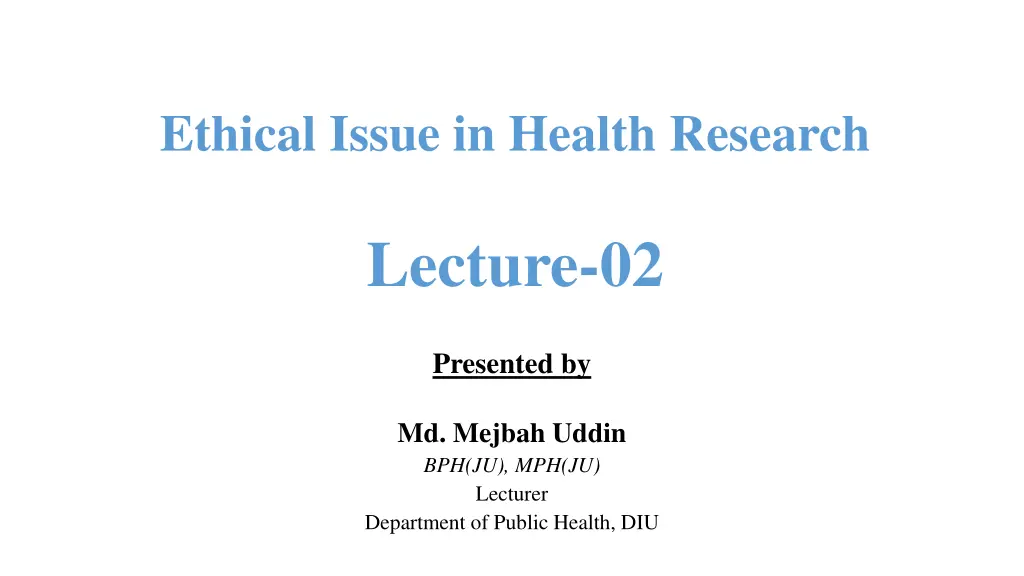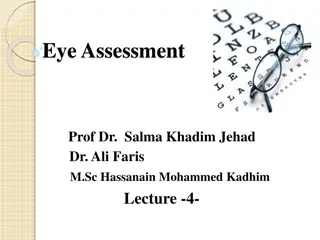
Understanding Ethical Issues in Health Research: Overview and Importance
Explore the fundamental concepts of health research, the importance of ethics, different types of research, and quantitative versus qualitative approaches in this comprehensive lecture presented by Md. Mejbah Uddin. Delve into the systematic investigation of health-related topics and the aim to improve public health outcomes.
Download Presentation

Please find below an Image/Link to download the presentation.
The content on the website is provided AS IS for your information and personal use only. It may not be sold, licensed, or shared on other websites without obtaining consent from the author. If you encounter any issues during the download, it is possible that the publisher has removed the file from their server.
You are allowed to download the files provided on this website for personal or commercial use, subject to the condition that they are used lawfully. All files are the property of their respective owners.
The content on the website is provided AS IS for your information and personal use only. It may not be sold, licensed, or shared on other websites without obtaining consent from the author.
E N D
Presentation Transcript
Ethical Issue in Health Research Lecture-02 Presented by Md. Mejbah Uddin BPH(JU), MPH(JU) Lecturer Department of Public Health, DIU
Outline Sl. No. Topics Learning Objectives 1 Concept of Research Understand the basics of Research 2 Aim and objective Understand Aim and objective of research 3 Basic classification of research Understanding Importance and principle of ethics Explain the major classification of research 4 Understand, explore the Importance and principle of ethics for research methodology
What is Research? Re+ Search= Research Re means again and search- means to find out something . So, Research means by using scientific and systemic way to find out something new or partially new things, tools, idea, measurement etc. again. It also means- Scientific investigation Problem solving approach To find out new tools, measurement etc.
Purpose & Aim of Research Aim of Research 1. Discover new facts or verify and test old facts. 2. Analyze their sequence, interrelationships and causal explanations. 3. Develop new scientific tools, concepts and theories which would facilitate reliable and valid study, intervention or action for human welfare.
Health Research Health research is the systematic investigation and study of health- related topics, including the causes, prevention, diagnosis, and treatment of diseases, as well as the study of health systems, behaviors, and policies. The purpose of health research is to improve our understanding of health and illness, enhance public health, and inform the development of interventions, treatments, and policies that promote better health outcomes for individuals and communities.
Types of Research According to application 1. Basic/Pure/Fundamental Research 2. Applied Research 3. Action Research According to Quality and Quantity 1. Qualitative Research ( Ethnography, Documentary, Case study, Historical) 2. Quantitative Research( Experimental, Descriptive, Correlational, Developmental) According to Experimental and Non- experimental 1. Experimental (True-experiment, Quasi-experiment, Expost-facto) 2. Non-experimental ( Descriptive, Correlational, Ethnographic, Documentary, Case study, Developmental) Developmental 1. Cross-sectional 2. Longitudinal
Quantitative vs Qualitative Research Characteristics Approach Quantitative Qualitative Well defined, using operational definition Holistic ,persons studied in their social environment Researcher position Objective, detached as distant observer Close personal contact and interaction Data type Showing statistical evidence of relationship between variables Qualitative, description of persons, their actions and behavior Data analysis Confirms or rejects hypothesis regarding relationship Provide insight into the finer meaning of personal behavior Merits Gives concrete baseline information for planning intervention or for measuring change after program Improves understanding of way people behave in a certain way or how people feel about certain things
Research methodology Step-1: Problem identification Step-2: Information gathering and knowledge building Step-3:Hypothesis formulation Step-4: Planning Research Step-5: Data collection Step-6: Data processing Step-7: Data analysis Step-8: writing research report based on data Step-9: dissemination of research findings through publication of report presentation in a seminar. Research methodology is the specific procedures or techniques used to identify, select, process, analyze information about a topic. and
Why ethics is needed for health research 1. Protect Participants: Ensures the safety, rights, and dignity of research participants, preventing harm and exploitation. 2. Maintain Integrity: Upholds the honesty and reliability of the research process, ensuring accurate and trustworthy results. 3. Promote Fairness: Guarantees that benefits and burdens of research are distributed equitably, avoiding discrimination or bias. 4. Build Trust: Fosters public confidence in research by demonstrating commitment to ethical standards. 5. Ensure Compliance: Adheres to legal and professional guidelines, preventing misconduct and promoting accountability.
Ethical principal for health research The ethical principles for health research can be summarized as follows: 1. Respect for Persons: Recognizing the autonomy of individuals and protecting those with diminished autonomy. 2. Beneficence: Ensuring the well-being of participants by maximizing possible benefits and minimizing potential harms. 3. Non-Maleficence: Avoiding harm to participants, ensuring that the research does not expose them to unnecessary risks.
4. Justice: Ensuring fairness in the distribution of the benefits and burdens of research, including the fair selection of participants. 5. Informed Consent: Providing participants with all necessary information about the research, ensuring their voluntary participation. 6. Confidentiality: Protecting the confidentiality of their data. privacy of participants and the These principles are essential for conducting ethical health research that respects and protects participants.
Ethical principles for qualitative research 1. Informed Consent: Participants should be fully informed about the research purpose, procedures, risks, and benefits, and must voluntarily agree to participate. 2. Confidentiality: Researchers must protect participants' identities and the privacy of their data, ensuring that sensitive information is not disclosed. 3. Respect for Participants: Treat all participants with dignity and respect, considering their perspectives and avoiding harm or exploitation. 4. Transparency: Be clear and honest about the research process, including any potential conflicts of interest. 5. Right to Withdraw: Participants should have the right to withdraw from the study at any time without any negative consequences. These principles ensure that qualitative research is conducted in an ethical and responsible manner.
Ethical principles for quantitative research The ethical principles for quantitative research include: 1. Informed Consent: Participants must be fully informed about the study and voluntarily agree to participate. 2. Confidentiality: Researchers participants' privacy and ensure that data is kept confidential. 3. Integrity: Research should be conducted honestly, avoiding fabrication or manipulation of data. must protect
4. Beneficence: The research should aim to benefit participants or society, minimizing any potential harm. 5. Non-maleficence: Researchers must avoid causing harm to participants. 6. Justice: Ensure fair and equitable treatment of all participants, without discrimination.
Writing an ethical clearance application for health research involves several key steps to ensure that the research adheres to ethical standards. Here s a guide on how to write one: 1. Title of the Study - Clearly state the title of your research. 2. Researcher(s) Information - Include the names, affiliations, and contact information of all researchers involved. 3. Introduction and Background - Provide a brief overview of the research topic, including its significance and objectives. - Explain the rationale for conducting the study. 4. Objectives of the Study - Clearly outline the primary and secondary objectives of the research. 5. Methodology - Study Design: Describe the design of the study (e.g., randomized controlled trial, observational study). - Study Population: Specify who the participants will be, including inclusion and exclusion criteria. - Sampling Method: Explain how participants will be selected. - Data Collection: Detail how data will be collected (e.g., surveys, interviews, medical records). - Data Analysis: Provide an overview of the statistical methods that will be used to analyze the data.
6. Ethical Considerations - Informed Consent: Describe how informed consent will be obtained from participants, including how they will be informed about the study s purpose, procedures, risks, and benefits. - Confidentiality: Explain how participant data will be kept confidential and secure. - Potential Risks: Identify any potential risks to participants and how these risks will be mitigated. - Benefits: Outline any direct or indirect benefits to participants or society. - Vulnerable Populations: If applicable, explain how you will protect vulnerable groups (e.g., children, pregnant women). - Compensation: Indicate whether participants will receive any compensation or reimbursement for their time and effort. 7. Research Team s Competence - Provide evidence of the research team s qualifications and experience in conducting similar research. 8. Data Management - Storage: Explain how data will be stored securely. - Retention: Indicate how long data will be retained and the process for eventual destruction. - Access: Specify who will have access to the data.
9. Dissemination of Results - Describe how the research findings will be shared (e.g., publications, presentations, reports). 10. References - Include any relevant references or literature that supports your research proposal. 11. Attachments - Attach any relevant documents, such as informed consent forms, questionnaires, or data collection tools. 12. Declaration - A statement confirming that the research will be conducted in accordance with ethical guidelines, signed by the principal investigator. 13. Institutional Review Board (IRB) Approval - Include the section for IRB approval, where the board will provide their official clearance for the research. Ensure that your ethical clearance application is clear, concise, and comprehensive to facilitate approval by the review board.






















